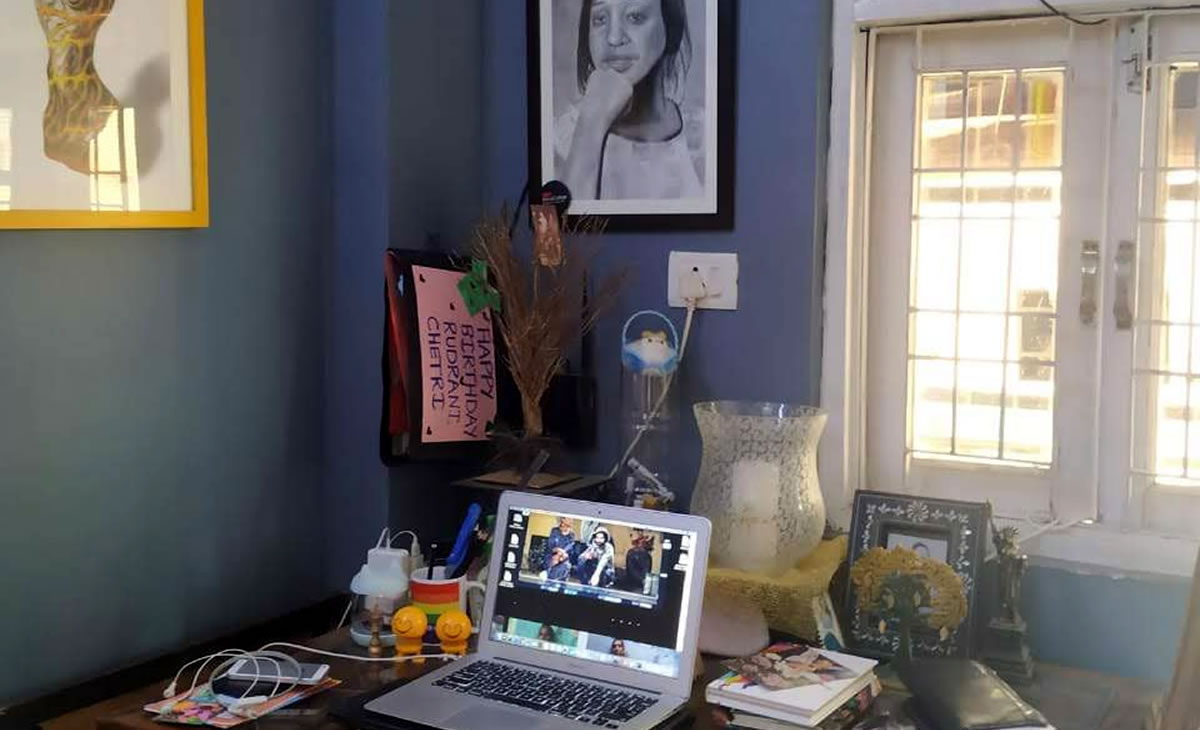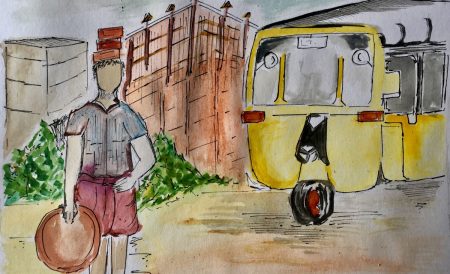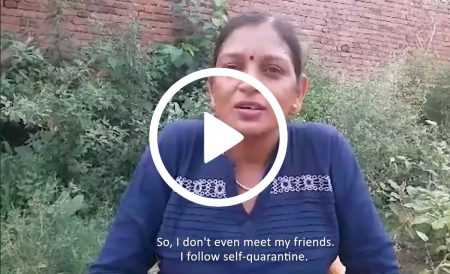Are you obsessed with division of labour at home? We were, even before the lockdown. Who does it? Who gets to do it? What does gender have to do with it? How do people take on roles, subconsciously, unknowingly? So much of the work of home-making is about love, and yet, it’s fraught, isn’t it? Could there be a way to separate the work of keeping a home from the gender identities it seemingly, ‘naturally’ encourages? Are there new ways of thinking about this division of labour in queer households?
When you are queer and have grown up up hearing, ‘girls like babies’ and ‘boys like sex’, ‘girls can’t drive’ and ‘boys don’t cry’ you hope that someday in your own home you will make your own rules. But gendered norms – ‘a man’s work’ and ‘women’s work’ – have ways of following you around if you are not vigilant.
This is the first in a two-part series of interviews with queer households in Delhi.
With inputs from TTE Team and Shamini Kothari.
So, we went looking for the perfect site, where we could put our enquiry to test. A site, which allows for communication, a certain kind of reflection, a site where the people who made the home may talk to us about gender and how it sometimes gets in the way, but sometimes, helps in making the whole thing play.
We found it in queer homes.
The Third Eye brings you five interviews, in two parts, with folx society calls atypical, queer. Their marginalization on the basis of gender and sexuality means they have neither the ease nor the burden of ‘knowing their place’ – in the kitchen, in the master bedroom, or in the public eye. They grew up hearing, ‘girls like babies’ and ‘boys like sex’, ‘girls can’t drive’ and ‘boys don’t cry’, but found that social rules about appropriate conduct weren’t talking about them at all. So, when they build their homes, they have to make up new rules. And yet, they also discovered that ‘freedom’ from gendered norms – the gendered rules that govern ‘a man’s work’ and ‘women’s work’ – are insidious and creep across all aspects of identity.
The Third Eye, then, learns from people who make queer homes, about how the making of homes is ‘work’ that needs workers willing to cross boundaries (masculine/feminine), transcend imbalances of power and the pain of socially denigrated functions (owner, earner, dependent and its many variations), and assume responsibility for the wellbeing of others (family, partners) and Others (with whom kinship is difficult: of a different gender, caste, class, species).
“Communication is key,” as Sana says, “but you have to work for it.”

Sana and Rashmi, early 40s lesbian couple in outer Delhi.
Sana recently moved to a flat in south Delhi with better transport links to work, and an all-round better location. She and her partner left behind a dog, a ‘streetie’, who used to sleep on their doormat.
“I’ve left my number, and food, and asked people to call me if he seems unwell or disappears. I hope he’ll be alright.”
He’s been living in the building nine years; I try and reassure her that he will.
“The woman in the house opposite didn’t like us or him,” she has told me before. She would call the landlord to complain, throw away his little bed, and threaten him. “We never told her per se, but people do get an idea.” There were frequent unsavoury remarks.
Fortunately, the landlord dealt with complaints in a businesslike way. On his own initiative, he tied the garbage cans, making everyone’s entrances to and exits from the building much less problematic.
“I hate taking out the garbage,” Sana says with decision. “When you’re washed and dressed for work you just don’t want to pick that up.”
But she does it.
“Well, yes… What’s the alternative?”
“In my previous relationship I became the one who would stay home from work by default, for pest control or to look after a friend, because my partner was a doctor and her work was always urgent. In this relationship – Rashmi didn’t have a job when she moved in, so she felt she had to do all the housework. And it’s a running joke, that when I do the housework each room will take three hours to clean or it won’t be ‘done’. She cooks better than I do. So, we needed to learn to communicate, about work either of us could or should do.”
And decisions about divisions of domestic labour are hard to negotiate, I agree.
I think it’s because neither of us is more or less ‘feminine’/ femme or ‘masculine’ butch than the other. We express our gender differently, but it’s not more or less. In a heterosexual relationship, you’ve been told ‘your’ work is based on your gender expression. Here, you have to work it out based on what kind of person you are.
“I lost my father when I was in Class IX, and my mother wasn’t the kind of person who would say, ‘wear this, don’t go there’. My sister decided things – she’s the dominating type of person – so I became the kind of person who really dislikes conflict. It’s not like I can’t be assertive when it matters, but I don’t like confrontation. I go along with things. And that’s how it’s been with my partners, too.”
“With Rashmi, there’s the constant tension in her, of taking on all the work, but also resenting it, and resenting me but also knowing I hadn’t imposed it so feeling guilty about the resentment. We talked about it, and divided up the work closely with a counsellor. But that created its own problems. Navigating around each other – she not touching what I was ‘supposed’ to do and vice versa – we were getting hung up on what was ‘her’ work and what was ‘mine’. We were living more like roommates than partners.”
So, I ask her, how did you queer your home again?
“We let go a little. We decided that ‘one week mine, one week hers’, works best. And there’s nothing preventing us from helping each other when one of us is overwhelmed – then our next week is lighter.” She pauses. “We also allocated our labour based on the skills each partner has to offer or what we enjoy doing more.”
“But you know I don’t think it’s very different from a heterosexual home… In a queer home you can do all that – have a partner, involve your family in your life, adopt a child, adopt a pet. I don’t really think of it as different from having a ‘home’…”
Abo, gay, shares home with few queer persons he is not in an intimate relationship with.
Abo lives in a two-bedroom in Delhi, with three persons who identify as men who love men. It is a ‘normal’ flatshare, with clearly defined rules about party music, basic hygiene in common areas (kitchen, hallway, bathrooms), labelled groceries, and management of non-human visitors. They employ a woman to clean, wash clothes in the washing machine (which came with the flat), and cook basic meals for all. The chores are divided equally via WhatsApp. Abo is “perfectly satisfied with the division of labour” – which amounts to him “shouldering most of the domestic work”.
Why?
“Why I’m satisfied? Because I’m the oldest! I’ve been living away from my parents’ home the longest so I have maximum experience with domestic work. The others can’t do it as well or as efficiently. It’s best if I do most of it, and assign tasks for others based on what’s needed.”
“But do you see the equation changing?” I ask him. “Are they learning from you, lightening the load?”
He waxes eloquent about them learning to cook special dishes from him. Yes… they’re learning.
Learning to cook, it seems to me, is a hobby not a preparation to take on tiresome chores… Is there something they won’t do at all, though, I ask.
Abo hasn’t wanted to be too revelatory with this interview. He says he doesn’t want to mess with domestic dynamics. If his housemates read this, they shouldn’t know it’s their home being spoken of. Now, he prevaricates for a good fifteen minutes before giving me a clear answer. The fact is, cleaning toilets, taking out garbage, unblocking drains – “that I do without complaint.”
“Then what do you mean by, ‘I’m perfectly satisfied with the division of labour’?”
“It’s hard to find flats as a gay man. It’s even harder to find flatmates one can get along with – whose habits match your own enough that living with them in the same house is not going to be a problem. In that context, finding housemates who will at least help around the house, not make too much mess and leave it to lie around – I’m satisfied!”
As far as I know, Abo hasn’t ever lived with women but has a sympathetic understanding of the women-and-housework situation. “I often talk to my students about it. We boys mostly grow up with this privilege – we’re rarely asked to shoulder any of the domestic work. I think it’s a necessary skill set, and everyone irrespective of their gender expression should learn how to do housework.”
“You don’t think more of your flatmates over the years have been less inclined to housework than you, or have been so ready to leave it to you, because they’re men?”
“No! Not exactly…” Abo’s flatmates are usually migrants like him, and migration, he feels, is a great ‘un-gender-er’. It might be true that men start off without knowledge of household chores and maintenance. “But, later in life, when men move to another city for work, we all end up learning things on our own, often from scratch.”
“Yes, but they leave it to you.”
“I have always supposed it has to do with a certain elite class-caste position – how they perceive what they can and cannot do in the house.”
Are his current flatmates upper-caste? And do they earn more than him, by and large?
“Well, I’m the migrant with the most broken Hindi,” says Abo, laughing. And as he himself says, class is not about how much money he makes today, or this month. Whatever his status might once have been, loss of parental backing has made his life a step more frugal.
He doesn’t say more about caste. But in almost every one of his homes in Delhi, it has mattered enough to lower the bar for how much help with domestic work he is “satisfied with”.
“Do you feel your queer home is repeating the unequal practices of your parents’ home, then?” I ask. There, women did all the work; here, he does.
My own queer home, I would say, is a parody of heteropatriarchal homemaking. The unequal division used to bother me a lot. But now, I’ve almost stopped thinking about it. The thing is, no arrangements are perfect. Being queer, there is a shared understanding. That’s completely lacking in homes where women do 99% of the domestic labour. In any case, when you’re queer, your home away from home automatically becomes queer for the space and freedom of expression it provides.
“So your home is queer because of that shared understanding? And freedom of expression?”
“Yes, definitely,” says Abo. “And yes,” he continues, “this definition of queerness is not limited to sexual minorities. Other kinds of marginalization can create the same – experience of war, or systemic injustice, or mental health issues. It’s about…”
“Solidarity.” Yes, I see.

Rudrani, trans, lives in a far-West Delhi suburb, with her cis male partner.
Rudrani’s home is lush with possibility. There are dogs and fish, someone cooking in the kitchen, inventively rendered gods and goddesses and spiritual guides on the walls, as well as abstract art and landscapes. A dizzying array of fabrics, a multiplicity of textures, shapes, and groupings of furniture, archaic-looking talismans and the latest in gadgetry. It does not look opulent, however – it looks lived-in, rooted for the moment, but light-footed, portable, dynamic.
She fits the house. Moves swiftly; knows exactly where to reach for a thing; handles it like there is nothing she does not handle often. Her ideas about spaces, living arrangements, work, love, and leisure are flexible, familiar with many perspectives on the thing, coherent in a way opinions expressed orally rarely are. But they flow in many directions, follow many leads, make their way back and keep moving.
The resin fountain in her balcony matches her conversation: long and dark, smooth-surfaced and bright, fresh and renewable.
“I spent this Diwali making it,” she tells me. “Every object in this house has meaning, significance. And my current partner must be the first, of four stable relationships over 41 years, who cares as much about my house as I do.”
He helps her clean and cook, cleans and cooks himself, stocks the cabinets, is interested in improvements, maintenance and repair. It is, however, Rudrani who usually does all the housework (with hired help), and repairs things – or very occasionally supervises repairmen. Of all our interviewees, she is the only one who speaks of marriage wistfully.
“All said and done, though, I know that one day he will leave. There is no structure possible, you see, no social sanction and no social obligation. What am I going to do if he decides he needs to get married? Sue him for abandonment? Even if it were legally possible I would have to jump through infinite hoops – explain what our relation was, explain who I am.”
Rudrani is trans – her gender expression and identity do not match the one she was assigned at birth. Her partner is cis male. I ask if her house is designed with the possibility of single occupancy in mind.
“Well… the labour of maintaining a domestic space is inextricable from the labour of maintaining the relationships in it, no? I carved out this space for myself but when I bought this house with my partner it wasn’t just a space to house my own identity, after all…”
But in another way, always. Partly because that is our reality: no trans person’s relationship with a cis person has a long lifespan. Grow old together – that does not happen. So, even when I’m in a relationship, my home has to be prepared for single occupancy.
“And, in another way too. I’m supposed to be part of a hijra gharana, no. (That is part of the prescription for my identity – there are prescriptions for queer identities too, no?) In it, there’s the stable structure, which is desirable, especially because for so many trans folks the stability of their birth families just isn’t there. But it also means that all the work you do, everything you earn, belongs to the people inside that structure – all the people. All your work belongs to the structure.”
“I didn’t want that. I wanted a home that was mine. If something happens to me I want to be able to say it’s my will, whom I leave everything to – my brother, my parents, my boyfriend… It had to be mine.”
Does she ever feel resentful, about doing all the work, sharing ownership, but not the responsibility of care?
“I don’t know. It is my reality. These are my choices. I felt scared once, when I was having a fight with my previous partner, and you know how you say, ‘either you go or I will’ and he said, go. And I went. At 11:30 in the night, I just got out of my own home. Sat at a chaiwala till four in the morning.
“But that doesn’t make me resent the ‘work’. The ownership, the entitlement, that comes from the way men view my identity. What I am is available. What I do – that’s irrelevant.
My current partner got so upset the last time two boys came to my door and asked for an ‘aashirwaad’. He didn’t even understand what they were saying, at first. When he understood, he wanted to attack them. ‘How can they, how dare they.’ And inevitably, ‘What do you do to make them think they can come here,’ they can ask such a thing… But it doesn’t matter what I do. My body, my choice, my desire, that’s all irrelevant, outside. In here – it’s only in here that those things can matter. Sharing that kind of safe space, having someone in here who takes that safety for granted, takes for granted that there is such a thing as ‘my’ body, ‘my’ choices, ‘my’ desire – it’s worth it. The work is definitely worth it.”
Urvashi V is an independent researcher, teacher, writer, and editor based in Delhi. She has worked in universities, publishing, and the development sector, and is currently working on animal personhood, domestic violence, and the scope of nonconformative genderedness.
Workshop
What Queer Homes Ask of All Of Us.
The queer homes that we visited gave us new things to think about, to challenge and question stultified notions of Home and Family. These homes encourage us to re-examine our own relationship and ways of understanding the domestic.
SOME QUESTIONS TO ASK OURSELVES, THOSE CLOSE TO US, AND MAYBE SOME STRANGERS TOO.
Home: It’s a space perhaps as much real as imagined by us. A mirror to who we were, what we have become, what we want to be. How do you think of your home? How much of you is reflected in your home? How much of you is hidden?
Family: It’s the smallest unit of society, and yet the most significant. What structures around gender does your family uphold? Think about the smallest thing, the way food is served, to the largest – how decisions around work and education are made.
Work: How do you think about it within your home, your family? Can we think more creatively, intuitively about division of work within our home? Not everyone is good at everything, but all of us are good at something. Can we evolve our own paradigm of equality and fairness based on our own unique experience of shared responsibilities, rather than a mathematical allocation of labour? How can work be negotiated variously, delicately in the day-to-day business of domesticity?
Making a home, creating a family is hard work in itself. Unpacking ‘gender’ and the accompanying expectations within that domain, is even harder. And what about other norms – of caste, class, religion, identity, togetherness – otherness – currents that the outside constantly pushes towards the Inside? How do these enter, interact and shape the domestic?
Is your imagination of home and family fixed, or continuously evolving, like it is for Sana and Rashmi, and Abo and Rudrani?
I
Sana & Rashmi try to allocate their labour based on, “the kind of person you are”- the skills each partner has to offer or what they enjoy doing more. How do you practice division of household chores in your home? Why? How gendered are those skills?
For Sana, her home is not very different from a “heterosexual home”. Do you feel that queer homes are different from heterosexual domesticity? What are the similarities and points of departure, for you?
II
For Abo, doing more work than his housemates is not a problem. “No arrangement is perfect”, and the reason he is “satisfied” is because despite the compromises, his home is a space entirely of his own making. A place where his housemates do not impinge on his identity, his way of life. Doing more work is then, perhaps, a small price to pay. What are the compromises that you have made in your home, for your partner/ family? Were these a matter of personal choice or did other pressures coerce you into these positions?
The act of moving out of the familiar (your parental/ familial home, your city) is in itself an “un-gender-er”, for Abo. Migrant men, like him, even if from a certain economic class, “…end up learning things…often from scratch”. To cook, to clean, to do household chores – migrant men doing acts of labour that typical heteronormative environs deem unnecessary.
Does the un-gendering get reversed when the same men step back into the familiar again? Do the men perform their maleness differently, more normatively, within the domestic, once they step back into their old worlds?
III
Rudrani’s complex experience of domesticity pushes us to think about how much of the domestic that we make for ourselves is of our own making? How much of your home is influenced by other factors, apparent or invisible to you? What are the things you rebel against to guard our own special space? When do we accommodate, what do we give in to? Why?
Rudrani is clear that despite her relationships, “…my home has to be prepared for single occupancy”. Who you share your home with today, may change tomorrow. There maybe a stage in your life when you may be alone. How do you think about alone-ness and home? Do you feel your notion of the domestic would change, based on who (or not) you share it with?





